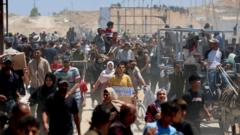In an alarming interview with the BBC, UN humanitarian chief Tom Fletcher described the situation in Gaza as one of forced starvation caused by Israel’s military actions and blockades. With urgent aid becoming increasingly restricted, Fletcher asserted that such actions could be classified as a war crime. This marks a significant shift in the international dialogue surrounding the ongoing crisis in Gaza, prompting global leaders to contribute to the call for intervention.
**Gaza Faces Humanitarian Crisis Amid Blockade and Conflict, Warns UN Official**

**Gaza Faces Humanitarian Crisis Amid Blockade and Conflict, Warns UN Official**
UN humanitarian chief highlights intense suffering in Gaza, calling the situation a potential war crime. As international scrutiny grows, the demand for immediate aid access becomes critical.
After weeks of near-total blockade, Israel has recently permitted limited aid into Gaza, which had been grappling with severe shortages of food, medicine, and other essential supplies. The situation has led to chaotic scenes at distribution centers, where Palestinians queued desperately for aid. Following reports of injury and disorder amidst these distributions, Fletcher condemned Israeli policies that prioritize pressure tactics on the population instead of addressing humanitarian needs.
Fletcher pointed out that Israeli Prime Minister Benjamin Netanyahu needs to openly reject comments made by Finance Minister Bezalel Smotrich regarding Gazans potentially seeking to relocate and start anew elsewhere. The humanitarian chief underscored the importance of international humanitarian law, urging for a commitment to human rights and the prevention of forced displacement.
International frustration with Israel's military strategy has been intensifying, as leaders from various nations call for an immediate cessation of military operations and unhindered humanitarian access to Gaza. Prompted by alarming reports from the ground, Fletcher addressed the urgent need for the UN Security Council to act decisively to prevent potential genocide, drawing parallels to historical crises where timely intervention could have saved lives.
In the complex backdrop of the Israeli-Hamas conflict, Fletcher expressed concerns about the overarching aims of the Israeli offensive beyond the initial goal of securing the release of hostages held by Hamas. He reiterated the challenge posed by ongoing military actions and their exacerbation of the humanitarian crisis, complicating efforts to mediate and resolve the conflict.
With escalating violence resulting in significant casualties, Fletcher highlighted the imperative of immediate humanitarian access to alleviate further suffering amongst civilians in Gaza. He affirmed the commitment of humanitarian organizations to ensuring that aid reaches the innocent victims of the crisis while sidestepping political entanglements.
As the international community continues to grapple with this deeply entrenched conflict, the call for unity against violations of human rights and international law remains more pressing than ever. The next steps taken by global leaders could prove crucial in determining the fate of those suffering in Gaza and beyond.
Fletcher pointed out that Israeli Prime Minister Benjamin Netanyahu needs to openly reject comments made by Finance Minister Bezalel Smotrich regarding Gazans potentially seeking to relocate and start anew elsewhere. The humanitarian chief underscored the importance of international humanitarian law, urging for a commitment to human rights and the prevention of forced displacement.
International frustration with Israel's military strategy has been intensifying, as leaders from various nations call for an immediate cessation of military operations and unhindered humanitarian access to Gaza. Prompted by alarming reports from the ground, Fletcher addressed the urgent need for the UN Security Council to act decisively to prevent potential genocide, drawing parallels to historical crises where timely intervention could have saved lives.
In the complex backdrop of the Israeli-Hamas conflict, Fletcher expressed concerns about the overarching aims of the Israeli offensive beyond the initial goal of securing the release of hostages held by Hamas. He reiterated the challenge posed by ongoing military actions and their exacerbation of the humanitarian crisis, complicating efforts to mediate and resolve the conflict.
With escalating violence resulting in significant casualties, Fletcher highlighted the imperative of immediate humanitarian access to alleviate further suffering amongst civilians in Gaza. He affirmed the commitment of humanitarian organizations to ensuring that aid reaches the innocent victims of the crisis while sidestepping political entanglements.
As the international community continues to grapple with this deeply entrenched conflict, the call for unity against violations of human rights and international law remains more pressing than ever. The next steps taken by global leaders could prove crucial in determining the fate of those suffering in Gaza and beyond.





















